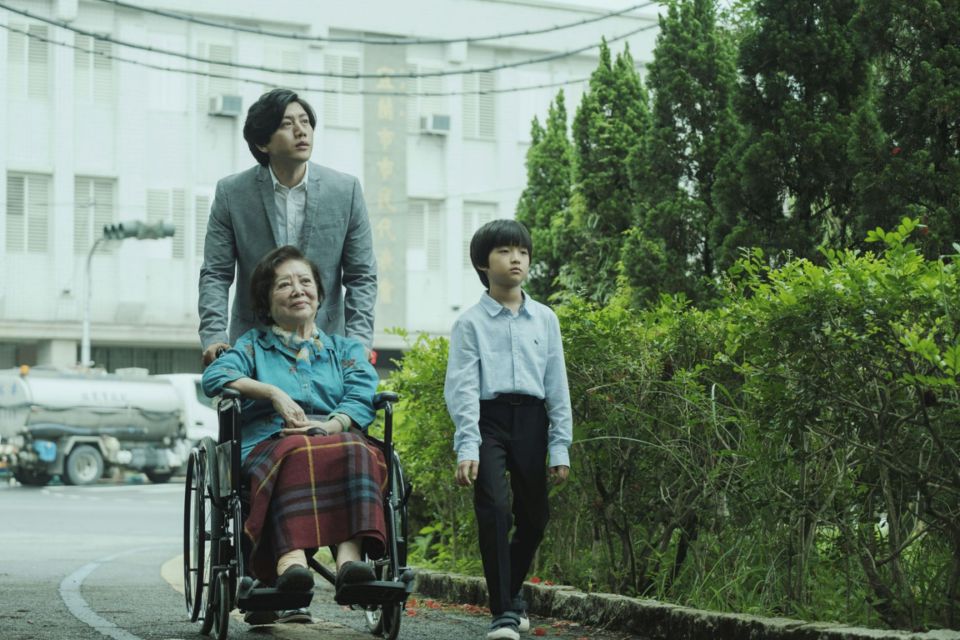(Spoilers Alert)

「 Dear Tenant 」is a social-awakening movie, about Taiwan’s, and perhaps Asia’s societal mistreatment of gay males. The story revolves around the protagonist Jianyi, a gay person, who lives under the tenancy of his male partner/lover’s mother (Grandma Wang) who knows of the relationship. Jianyi cares for the partner’s nine-year-old son Wang Youyu from the previous (heterosexual) marriage, and for landlord Grandma Wang, who suffers from septic diabetes.
A perspective little known, is the long term love between some gay partners, portrayed here by Jianyi and his lover, punctuated only by the latter’s need for societal acceptance – to be married and have children. A family has to be broken up (Youyu’s parents), before Jianyi could be with Youyu’s father.
The story picks up from Jianyi having to continue to look after Grandma Wang and Youyu, after the partner passed away in a misadventure. An outsider, Jianyi still nurtures and nurses the Wang family young and old, even for when Grandma Wang’s younger son came visiting (he covets the tenanted property), and Jianyi always taking the subservient role of an adjunct to the Wang family, eating and praying visibly away from the Wang family.
The bond that forms between Jianyi and Youyu is undeniably one of a loving stepfather-stepson relationship, but Youyu is denied the knowledge of the gay partnership between his late father and Jianyi. Grandma Wang is passive aggressive towards Jianyi, blaming Jianyi somewhat for her son’s untimely death, yet still appreciates his tender care for her open wounds on her lower leg, all the while concealing the truth from Youyu.
Jianyi’s sense of filial piety and loyalty effuses throughout, even when this role is typically reserved for a widowed daughter-in-law, but he plays that role well in the Wang household. In reality, the recent law in Taiwan that recognizes gay marriage belies the premise of the rest of this story.
The plot thickens, when Grandma Wang dies of an overdose, after having secretly willed the property to her grandson Youyu, and also having convinced Jianyi earlier to adopt Youyu. She passes over her own younger son for inheritance and custody. Immediately, red flags of a coup are raised and law enforcement authorities summoned.
CID investigates the alleged crimes – murder and fraudulent possession. The investigation shows heavy-handedness, from the lack of sensitivity to Jianyi’s mourning of Grandma Wang; his relationship with his late partner; and to the suspicion of child abuse attributed to Jianyi’s sexual orientation. The investigator’s pernicious burrowing also ruins Jianyi’s career, by outing him in various communities.
The fractious nature of these unorthodox relationships and arrangements shows the fragile lattice of a society for the heterosexual majority. Deep fissures of society become clear, when Jianyi signs Youyu’s assignments and the school teacher questioning the former’s relationship with the boy. The disapproving voices from Youyu’s classmates illustrate the disdain that emanates even from that young a bunch, with traditional family structure the only one they know.
The inner circle of gay people who just want to live their lives, and their immediate families and friends who enable without prejudice, is disrupted by the outer world looking in through tinted glass. Grandma Wang did what she did because she trusted Jianyi more than her younger son, and wanted to give her grandson Youyu a fair chance in life.
It is difficult to find balance among the eastern culture of duty, traditional values, and blood relation. Jianyi’s sense of guilt, in the lifestyle he chose and the lives he affected, and the responsibilities towards both the older and younger Wangs, quickly becomes a struggle, one that will have him walk the sad path of self-sacrifice, a juxtaposition against the western culture of empowered self-determination.
Some may think mistreatment sound a harsh opinion, and mishandling a better descriptor. However, when the direct effects are hurtful, and the indirect effects are of a society placing this demographic to be subjected to wider and harsher treatment, physically and mentally, knowingly or unknowingly, it is not hard to realise the law is but one aspect of the management of human affairs — society needs time and space to grow a heart to soften the hard edges of the law.
Laws should be made with real life impacts in mind. Society will then take time to catch up. Even when gay people are not seen as criminals in law, they will continue to be the brunt of society’s insidious discrimination for a long time.
( 「 Dear Tenant 」 won three Golden Horse Awards in 2020 )




